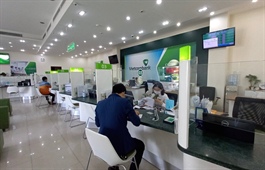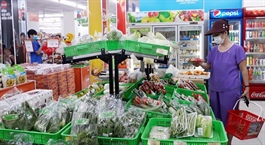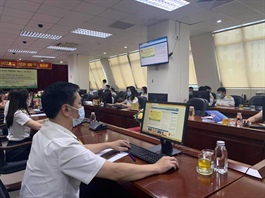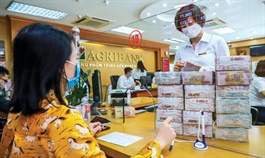How mobile money services operate
How mobile money services operate
At the most basic level, mobile money is the provision of financial services through a mobile device, and the used applications are typically small pieces of software embedded on a SIM card or available over a mobile network.
With an appropriate application, a customer can use their cellphone to transfer values wherever there are wireless phone services, and the recipient of such a transfer may then use that value for trading goods or visit an authorised agent for changing it into cash. Mobile money has thus proven an effective way to provide access to finance to millions of unbanked people around the globe.
In Vietnam, mobile money services came to public attention at the beginning of 2020, when it was mentioned on social media as the newcomer in financial services. It was not until last March that the prime minister adopted a pilot programme for mobile money services (MMS) under. The pilot will run for two years from last November.
The aim of the pilot programme has been to promote cashless payments and encourage access and use of financial services in Vietnam, especially for people living in rural and mountainous areas suffering from financial exclusion and lack of access to common financial services.
Qualified providers
To be eligible to participate in the pilot, an applicant must have an e-wallet license and another one to establish a public land mobile network using radio frequency bands (the PLMN licence), or must be a subsidiary that is allowed to use telecommunications infrastructure, network, and data of its parent company that has a PLMN licence.
The application dossier must be submitted to the SBV for their appraisal and approval, which will include additional review and written consent from the Ministry of Information and Communications (MIC) and the Ministry of Public Security (MPS) as co-supervising authorities.
As disclosed on the MIC’s website, as of the end of 2020, only eight telecom companies have been granted a PLMN licence. This small number narrows the pool of eligible applicants to the MMS pilot programme. Currently, only MobiFone, VNPT, and Viettel are approved to participate in the pilot.
In a recent report from JPMorgan, seven out of 10 Vietnamese individuals do not have a bank account. Under the MMS pilot programme, a provider can reach and provide relevant financial services to a large Vietnamese population who are mostly residing in rural, mountainous, and remote areas and are unbanked, to allow them to transfer money and/or purchase goods and services at merchant stores (or remotely) using their mobile phone (even non-smartphones) instead of cash, and without the requirement of having a bank account.
A customer can register for an MMS account and carry out relevant transactions directly at the business location of the provider, or remotely without internet by dialling unstructured supplementary service data codes, which are quick codes on their mobile phones or online via an e-wallet app of the MMS provider. Each customer is allowed to open one MMS account at each provider.
The following transactions are permitted to be processed by the customer through their MMS account:
- Cash deposit: to deposit cash into their MMS account directly at relevant business locations, or via their bank account, or the e-wallet account opened at the provider;
- Cash withdrawal: to withdraw the deposited cash directly at relevant business locations, or withdraw from the MMS account to the user’s bank account, or to an e-wallet account opened at the same provider;
- Payment of goods and services: to use the MMS account to pay for goods and services at the payment acceptance units; and
- Money transfer: to transfer money between an MMS account and other accounts of other customers of the same provider, between an MMS account and the user’s bank account, and between an MMS account and the user’s e-wallet account opened at the same provider.
All MMS-related transactions can only be conducted domestically in VND, and the total transaction value for all transactions is limited to VND10 million (nearly $435) per month for each MMS account. Transactions which require cross-border payments are not allowed via an MMS account.
Identification of account holders
Considering the current situation of spam and junk SIM cards in the country, there are concerns about identity theft and fraudulent activity increasing, which may adversely affect the development of MMS and the pilot programme if there is no sufficient mechanism for providers to identify their customers.
Under the pilot programme, therefore, the PM has required that providers must only provide MMS to customers whose identification document matches their mobile subscription identification number (MSIN), and who has been duly identified and authenticated by the provider. The MSIN must have been activated and used continuously by the customer for at least three consecutive months before registering for the MMS account.
Furthermore, when detecting any signs of criminal activities, illegal acts, unusual and suspicious transactions, the MMS provider must temporarily lock the account and provide information of that account to the SBV, the MIC, and the MPS.
While there is a large expectation for the positive effect mobile money will have on Vietnam’s economy and promotion of the government’s interest in moving towards a cashless society, the pilot programme has only been in place for a few months, and most of the two-year period remains. It is therefore too early to make any statement on the efficacy of the programme.
There is one thing we know, however, that if the results obtaining from the MMS pilot programme are positive, it will become a practical and valuable guideline, and lay a strong foundation for the Vietnamese government and relevant ministries to create a legal framework for MMS in Vietnam. In that case, we may see a whole new chapter for mobile services in this country.
























